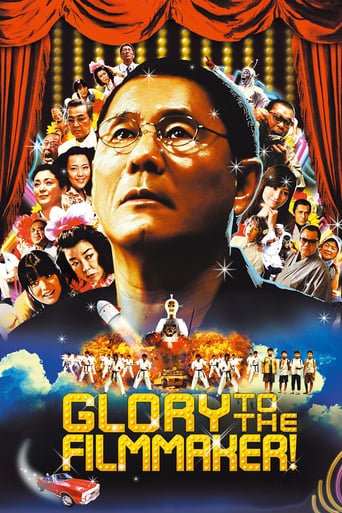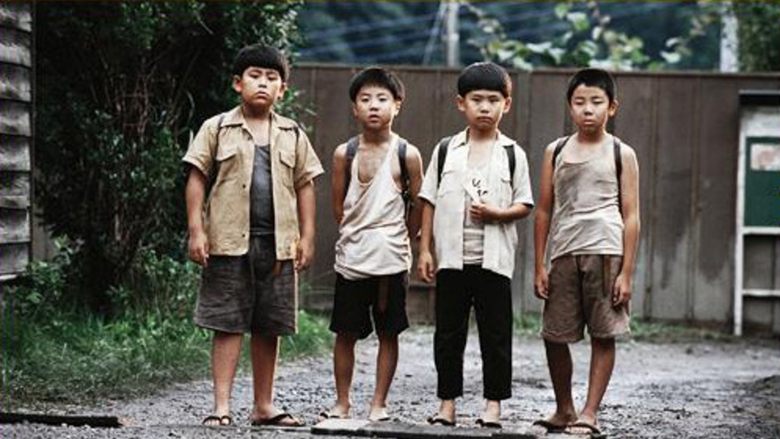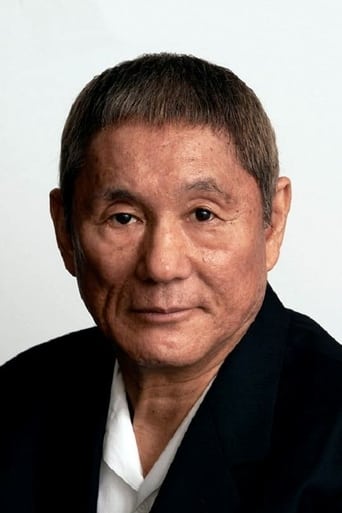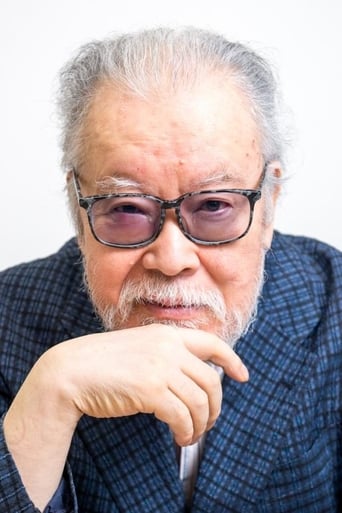

Glory to the Filmmaker! (2007)
Takeshi Kitano plays a version of himself in which he's a struggling director cycling through a number of different genres in an effort to complete his latest project.
Watch Trailer
Cast


Reviews
That was an excellent one.
Pretty Good
How sad is this?
Don't listen to the negative reviews
My first experience with Taksehi Kitano (aka Beat Takeshi) as director as well as lead actor, and I say file away under first class WTF right next to Funky Forest and Night Dreams (review forthcomming).My first experience with Kitano was the disquiet ting almost sympathetic teacher in "Battle Royale", but I knew right away he was an actor worth looking into, and I'm usually not very interested specific in actors. The beginning when Kitano and his matching dummy (who trade places throughout the film, whenever Kitano feels pressured or uncomfortable) think of new films to make Kitano a success.They try gangster movies, because they are what Kitano is best at, but he has done too many of them and wants to get away from being typecast. Then they try a "traditionally Japanese Ozu like film- the kind Wim Wenders would like", but it too falls through "who wants to waste a half hour on drinking liquor and tea?" Stories about the "common folk" aren't common anymore, and the black and white is now just alienating. They go through a few romances first where a woman is devoted to a man who is usually an artist or in some way disabled and these are called romantic comedies. Then they decide this is sexist so they try films where a man is devoted to a woman, and they call these tragedies. Martial arts period films and horror films get their turns as well, since both do well in foreign markets and might even get remade, but horror gives way to comedy, and neither make nearly enough at the box office.All of these failures are visually punctuated by the suicide/murders of the Kitano shaped doll.Then providence strikes and Kitano knows what to do, he will make a big budget CGI sci-fi spectacle about meteors racing to earth, only the meteors will have faces and are supposed to become major characters in the film. After that reason abandons ship altogether and the last 45 minutes to an hour are the worlds longest Monty Python sketch involving Kitano as the assistant to a mad scientist/industrialist, and a mother and daughter trying to make cash the easy way, by putting roaches in their food at restaurants, getting hit by cars, and finally marrying Kitano. Trips to France, pro-wrestlers, villagers hopping like bunnies, robots, and generally inexplicable events follow one after the other until the credits.In Godard like fashion even the characters seem out of place in this slapdash world, asking about why certain earlier strange things happened, at which point Kitano transforms into the wooden doll version of himself (if only we could all do this to get out of tough questions.)I laughed a few times, mostly out of surprise, but sometimes out of exhaustion. There's an early scene where Kitano tries to make a drama about the 50's, but fails once he realizes Japan in the 50's was the wrong place at the right time.The nostalgic and innocent decade of American pop, was there a time of "discrimination, poverty, and domestic abuse". It was also when Kitano grew up, moments which begin with promise of sentiment or catharsis segue into reminders of social horror at every turn.I don't think he necessarily intended this scene to be the "heart" of the film, and not just another spoof scenario, but it goes longer than most of the others, and after seeing it, and the conceptual loops, dead ends, and false starts. The film maker goes through for sake of "glory" it's easy to understand how it might be tempting to just turn into a block of wood, and let your Id make the decisions (the caricature is at least indestructible).Easier but not necessarily always entertaining to watch. Kitano did in fairness get his start as a stand-up comedian in the Manzai style (think fast past Abbot and Costello back and forth banter, which in Japan goes back to the 700's.), and many sequences like the martial arts instructor and his master, or the exploits of the strange stuffed animal ladies do take on the format of a Manzai routine. With a little cultural perspective the madness does have a method.Though considering the great ode to artistic impotence "8 1/2" has now become a star studded Hollywood musical in "Nine", it's easy to understand Kitano's frustrations with the cinematic redundancy and the bastardized genre permutations that they spawn.
I can see why some people would hate this movie, but there are a lot of people who shouldn't miss it. I will argue that it is immensely funnier and more meaningful if the viewer: 1.) Has seen several of Takeshi's other films (at least one or two gangster ones, Kikujiro no Natsu, and Zatoichi for good measure)and2.) Is familiar with classic Japanese cinema, particularly the works of Yasujiro Ozu...but samurai and horror films are skewered here, too, so if they're more your bag, you'll still have something to relate to.Bonus enjoyment if the viewer: 3.) Has some knowledge of Japanese and can catch the nuances that subtitles can't capture--the subtitles are indeed serviceable, and my Japanese isn't good enough to understand it without them, but some of the ritual Japanese expressions I caught were uproarious in certain contexts in the filmand 4.) Has spent some time in Japan. I feel like Japanese society, ritualistic conventions, and mannerisms are lampooned often in the film, and any Westerner who is often confused or frustrated by them may find this film a relief and a delight.All in all, though, what is most necessary is an open mind. This film does not have a very meaningful ending, and even makes fun of the loose ends it leaves undone. It was made for the sake of comedy and is not plot or character-driven, so don't expect Hana-bi. If you're looking for a send-up of Japanese cinema (including the director's own works) and some completely ridiculous, from-way-out-in-left-field humor, check out Glory to the Filmmaker. Some of the gags do fall painfully flat, but even some of the really silly stuff made me laugh harder than I have at any other film in quite a while. Some of the film parodies are pretty subtle and understated, where you could *almost* take them seriously if they weren't in the context of such a ridiculous film, but since the movie makes it clear from the start that everything's a joke, you'll find yourself laughing out loud at the little things that are deliberately askew in them. The narrator is wonderful, too, and is responsible for a good portion of the laughs in the film. Personally I found this more accessible and far more enjoyable than Takeshis', perhaps because unlike that film, the director's intentions are clear here from the start: he's just doing it for the laughs.
So.. Kitano has a sense of humor after all! Just kidding. The movie has some points for the general audience but most of it requires some background in history of Japanese cinema, kitano's career, kitano way of life, etc..So if you really want to see everything from Kitano's factory it's OK to watch, if you are really knowledgeable about all that stuff you probably got to watch it, but if you are neither one of them then you'll do fine without even knowing that it exists, although if you watch it (and have the presence of mind of not expecting much of it) then you can have a reasonably good time with it.Kitano is having a hard time accepting he is meant to make movies of a special kind which is not the case of this movie.. He even mentions it in the movie: "I said I wont do another movie with violence and I got to stick to it" Well.. I'm afraid our dear Mr Kitano will have to swallow those words sooner or later, preferably long before he runs out of money.
Seen in the Toronto International Film Festival After a series of Kitano classics culminating in the highly and widely acclaimed "Hana-bi" (1997), the master of avant-garde Japanese gangster movies wanted to venture into other genres. "Kikujiro no natsu" (1999), a heart-warming road movie (in some ways not unlike Brazil's "Central Station" (1998)) is a favourite of mind. After another brief re-visit to the gangster genre with "Brother" (2000), he tried something else rather surreal "Dolls" (2002) which received a general verdict of beautifully filmed but too obscure to understand. Then came a very main-stream "Zatoichi" (2003), his reinvention of the popular iconic blind swordsman in the 60s, which was good enough to win the "people's choice" award in that year's TIFF. But it has been 4 years since then and there was nothing of any significance coming out of him This latest work, "Glory to the filmmaker" seems to serve a dual purpose yet another attempt to do something different, and also his own personal statement about his frustration with not having any more inspirations. There could actually be a third message, a lament of the current state of affair of the Japanese film industry.The movie starts by showing Kitano's proxy, a full-size blown-up doll of himself, going through a series of medical tests, ending with a scene in the consultation room where the doctor says to the doll, "Next time, send himself". It's kind of difficult to decide which one of them is more expressionless, the doctor or the doll.In the rest of the movie, we see Kitano walking around with this doll, as well as appearing in scenes interchangeably, as the plot (if it can be said to have one) unfolds under an ever-present voice over narrator. Essentially, the first half is about numerous attempts he himself makes with various genres, from traditional Ozu to trendy Hollywood CGI Sci-fi, and everything in between. The second half seems to talk about what he finally ends up making, a story about a mother-daughter team of con artists whose target is a character played by himself. Playing the daughter is 20-year-old Anne Suzuki who, after some minor roles, came to herself in "poetic director" Shunji Iwai's "Hana and Alice" (2004) and later took part in "Initial D" (2005), Hong Kong's rendering of Japan's immensely popular car racing manga.Turning back to "Glory to the filmmaker", the material in the loosely linked comic sketches appears to be drawn from Kitano's own earlier standup comedy routines as well as Monty Python, the two prime suspects. There are some really funny moments but the movie is not devoid of stretches of banality. The most brilliant gag is an illuminating comment made by one of the characters toward the end, to the effect that whenever times go rough, our protagonist would turn into a mute blown-up doll. What empathy! Isn't that what we all would love to do.The movie concludes with a very clear message. Kitano is back in the consultation room, himself rather than the doll, to hear the final diagnosis. "There's a problem with your brain," explains the doctor, "it's broken".




